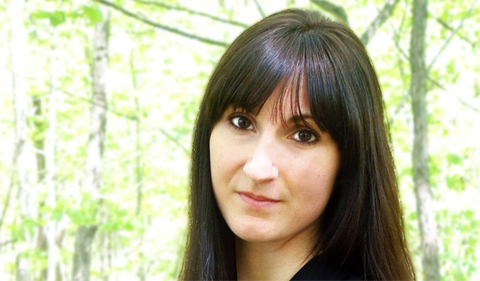
Marjorie Celona
The English Department’s 2018 visiting fiction visitor, Marjorie Celona, gives a reading on Thursday, Jan. 25, at 7:30 in Walter Hall Rotunda.
Celona received her MFA from the Iowa Writers’ Workshop, where she was an Iowa Arts Fellow and recipient of the John C. Schupes fellowship. Her stories have appeared in Best American Nonrequired Reading, Glimmer Train, and Harvard Review. Her novel, Y, was published by Hamish Hamilton in 2012. It won France’s Grand Prix Littéraire de l’Héroïne for Best Foreign Novel and was also shortlisted for the Willliam Saroyan International Prize for Writing. She teaches at the University of Oregon.
Raw Compassion in Marjorie Celona’s Y
Celona begins her novel Y with 16 descriptions of the letter, and this is what introduces us to a story where nothing just is: character descriptions, settings, and the plot that unfolds throughout are never delivered to the reader tidily. Instead, our perceptions of every aspect shift as the revelation of our characters’ individual histories forces us to revise our opinions of even the most troubling of them. As our narrator, Shannon, works through the relationships of her life, she seeks to discover the mystery of her birth, and she grapples with questions of identity, belonging, and even predestination. Though the novel is based on her questioning, we’re never in doubt about why we’re reading. The book is emotional, challenging, and ultimately cathartic.
Celona, who honed her craft at the Iowa Writers Workshop, has published in various publications, including The Best American Nonrequired Reading and Harvard Review, among others. Her writing is largely characterized by the insight she has into her characters, especially when their experiences are messy and confusing but punctuated by moments of beauty and understanding. If empathy is the realization that every human being is as fully complex and realized as we are, then Celona’s empathy for her characters and the empathy she evokes in us as her readers is undeniable. Her character depictions feel consistently measured, thoughtful, and fully lived. She knows Shannon, and so we come to know her too.
The novel’s opening scene portrays Shannon’s mother leaving her on the doorstep of the YMCA, and the rest of the book chronicles the events in her mother’s life that lead to this moment, as well as Shannon’s childhood in the foster care system. Seeing both narratives unfold against each other, readers understand these characters and their struggles with a clarity afforded by the careful attention Celona devotes. The shame and confusion that Shannon’s mother feels after her first sexual encounter will be achingly familiar for many readers, and Shannon’s simultaneous longing for and fear of intimacy will resonate with most. The wounds that these characters experience are so vividly rendered that even the most sheltered reader will recognize the humanity that throbs beneath each word. In one scene, Shannon asks herself, with poignant confusion: “Am I a bad person? I think about this almost every day. Would I know if I was?” But Celona affords her characters much more grace than they offer themselves, and while Shannon questions her own worth, Celona’s unwavering depiction of her in her totality, from her flaws to her astonishing capacity for forgiveness, clearly grants her a complexity that defies the descriptor “bad” or even good. Instead, Shannon becomes something much more perplexing.
Y is a novel that questions everything, making its title both superbly simple and superbly complex. It strips our narrator of that first essential connection to the world—parents—and leaves her adrift with struggling caretakers, some of whom are as ill-equipped to deal with life as our child narrator is. Shannon’s vulnerability as a foster child and her elemental loneliness will leave you raw, searching for someone to blame. Yet Celona will not give you that satisfaction, because everyone is somewhat to blame and no one could ever be fully to blame—life is far too nuanced for easy answers. Still, this novel astounds with its moral vision; it’s quietly hopeful despite its characters’ shortcomings, and it coaxes us into seeing their lives as we see our own—with some dread but plenty of compassion.
It has been said that books can be medicine, and this one seems like the perfect prescription for readers seeking a kind-voiced writer with the wisdom to find the humanity in anyone.


















Comments